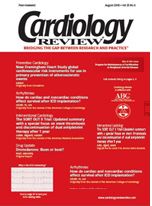Publication
Article
Cardiology Review® Online
Fish oil supplements may lower cardiac risk by increasing heart rate variability
Arrhythmias
Fish oil supplements appear to confer their cardioprotective effect by improving autonomic function as measured by a significant increase in heart rate variability (HRV), thereby reducing the risk of fatal arrhythmias, according to research published in Chest (2005;127[4]:1102-1107). In the same study, soy oil was associated with a lesser but significant increase in HRV.
Researchers led by Fernando Holguin, MD, assistant professor of medicine at Emory University School of Medicine, Atlanta, measured HRV in 52 nursing home residents for 2 months before they were randomly assigned to fish oil or soy oil supplements (to establish baseline measures), and then every other day for 4 months after the supplements were started. Subjects assigned to fish oil received 2 g/day in divided doses; each capsule contained 83.2% of omega-3 fatty acids (docosahexaenoic acid and eicosopentanoic acid). Those assigned to soy oil capsules received 2 g/day in divided doses, with each capsule containing 6.78% of alpha-linolenic acid, 16.3% of saturated fat, and 52.7% of linoleic acid (omega-6).
All HRV parameters increased significantly from baseline in the group assigned to the fish oil capsules. All HRV parameters except the low-frequency (LF) component increased significantly from baseline in the soy oil group. After adjusting for age and mean heart rate, total HRV, the high-frequency (HF) and LF components, the standard deviation of normal RR intervals increased significantly from baseline in subjects assigned to fish oil, whereas soy oil supplementation was associated with a significant increase in the standard deviation of normal RR intervals and only marginally significant increases in the HF and LF components.
Patients assigned to fish oil experienced an increase in HRV within the first 2.7 weeks, contradicting the previous notion that the benefits of fish oil supplementation are not apparent in the short term. It took 8.1 weeks for HRV to increase significantly in the group assigned to soy oil.
Compliance with supplementation was greater than 90% in each group. No significant clinical adverse events occurred, but belching was more common in the fish oil group compared with the soy oil group (41% versus 16%).
Increasing HRV may be an effective form of primary and secondary prevention of cardiovascular mortality, given that reduced HRV predicts mortality and arrhythmic complications after myocardial infarction and in apparently healthy middle-aged and older persons, note the authors.
They write, “a diet supplemented with omega-3 fatty acids derived from either soy oil or fish oil in conjunction with other factors known to increase HRV such as exercise, weight loss, stress reduction, and restoration of normal sleep could be part of an effective way to improve cardiac autonomic function.”
They add that the population studied had a low dietary intake of omega-3 fatty acids, so extrapolating the findings to populations with higher fish intake may not be possible.
In an editorial that accompanied the study, Hussam Abuissa, MD, and colleagues note the potent antiarrhythmic effects of omega-3 fatty acids in animal and human experiments. The largest randomized controlled trial on the effects of omega-3 fatty acids—the GISSI-Prevenzione Trial—demonstrated a 45% reduction in sudden death and a 20% reduction in all-cause mortality after 3.5 years among patients with known coronary heart disease (CHD) who were randomized to receive 850 mg/day of omega-3 fatty acids compared with placebo.
The favorable effect of marine omega-3 fatty acids may also lie in their ability to lower heart rate, according to Dr. Abuissa, preventive cardiology fellow at the Mid-America Heart Institute in Kansas City, Missouri. Heart rate is positively associated with the risk of sudden death; in one study of 18 CHD patients, omega-3 fatty acid supplementation lowered the resting heart rate by 4 beats per minute.
